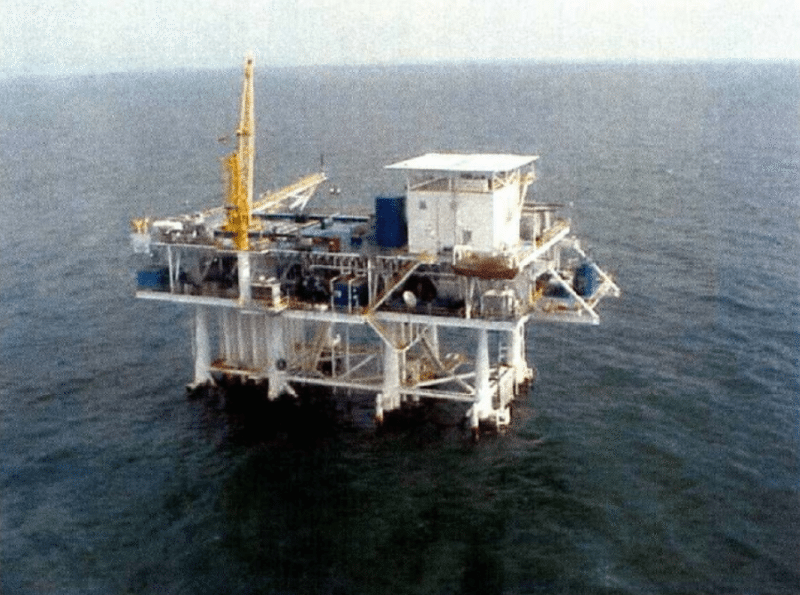(Taylor Energy’s Mississippi Canyon 20 platform, before its destruction in 2004. Credit: Taylor Energy)
It’s quite possible that you’ve never heard of the Taylor Energy oil spill (unless you’re from Louisana) and that’s because the company has worked hard for the last fourteen years to keep it a secret “in the hopes of protecting its reputation and proprietary information about its operations,” 1. At least that’s according to a lawsuit that forced the company to reveal its cleanup plan and alerted more people about the situation. You see, for six years the spill was quietly leaking into the Gulf with no one the wiser. That is until environmental watchdog groups monitoring the BP Deepwater Horizon disaster a few miles north of the site stumbled upon some oil slicks in 2010.
RELATED STORY:
After leaking millions of barrels of oil into the Gulf of Mexico for the last fourteen years, it has become one of the worst offshore disasters in U.S. history.
“Between 300 and 700 barrels of oil per day have been spewing from a site 12 miles off the Louisiana coast since 2004, when an oil-production platform owned by Taylor Energy sank in a mudslide triggered by Hurricane Ivan. Many of the wells have not been capped, and federal officials estimate that the spill could continue through this century. With no fix in sight, the Taylor offshore spill is threatening to overtake BP’s Deepwater Horizon disaster as the largest ever.
As oil continues to spoil the Gulf, the Trump administration is proposing the largest expansion of leases for the oil and gas industry, with the potential to open nearly the entire outer continental shelf to offshore drilling. That includes the Atlantic coast, where drilling hasn’t happened in more than a half-century and where hurricanes hit with double the regularity of the Gulf.”2
RELATED STORY:
That this information is just now coming out is likely not a coincidence. You see, many people- including the President- want to open up the Atlantic coast to federal offshore leases. That’s right, drilling in the Atlantic. Now, while this wouldn’t happen immediately (likely a decade) “The industry would first want to conduct seismic testing to determine the amount of oil and gas in the ground…which some studies say harms marine life, including large mammals such as dolphins and whales.”3
Basically, it’s not bad enough that the Gulf Coast is a mess but seismic testing in the Atlantic would harm marine life BEFORE drilling even started…which would also damage marine life when the oil spilled. Because it’s just a matter of time. We’ve seen this. Repeatedly.
You see, what many people might not realize is that the Gulf is already filled with industry:
- The Gulf is one of the richest and most productive oil and gas regions in the world, expected to yield more than 600 million barrels this year alone, nearly 20 percent of the total U.S. oil production.
- Another 40 billion barrels rest underground, waiting to be recovered, government analysts say.
- About 2,000 platforms stand in the waters off the Bayou State.
- Nearly 2,000 others are off the coasts of its neighbors, Texas and Mississippi.
- On top of that are nearly 50,000 miles of active and inactive pipelines carrying oil and minerals to the shore.
But it comes at great cost. Each year an average of 330,000 gallons of crude spill in Louisiana from offshore platforms and onshore oil tanks, for every 1,000 wells in state and federal waters there’s an average of 20 uncontrolled releases of oil (or blowouts) every year, a fire erupts offshore every three days, on average, injuring hundreds of workers, and at the Taylor’s platform, the broken wells were releasing so much oil that researchers needed respirators to study the damage.
RELATED STORY:
But there’s so much more to this story, which is already pretty unbelievable. There’s the fact that Taylor Energy is trying to walk away from their responsibility to clean up the mess, an explanation on Patrick F. Taylor, a magnate and philanthropist who took over this particular oil rig from BP (who themselves made a mess in the Gulf) and made a fortune before suddenly dying, and the fact that the spill is far and away worse than anyone ever thought…and for the rest of that story, click here.












